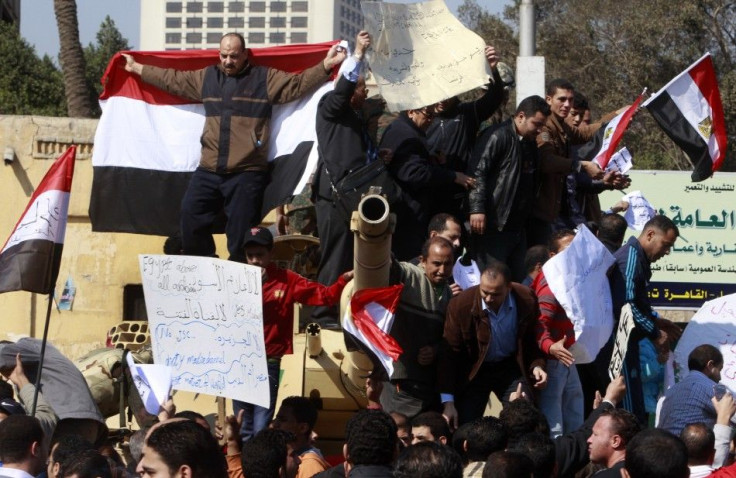Protests in Egypt enter 15th day; protesters say pay hike to govt staff not enough

Protests demanding an immediate end to Hosni Mubarak’s rule entered the 15th day on Tuesday in Egypt with protesters pitching their tents in central Cairo’s Tahrir Square and refusing to leave until their demand are met.
Egypt government had on Monday offered a 15 percent pay hike to its public sector staff and pensioners although pro-democracy protesters feel it is not enough to end the crisis.
Meanwhile, Omar Suleiman, Egypt’s newly appointed vice-president on Tuesday said Mubarak will set up a panel that will carry out constitutional and legislative amendments to enable shift of power even as Mubarak made it clear that he had no plans to demit office until September when his term ends.
Suleiman has also proposed to go after corrupt government officials, liberalize media and communications besides lifting emergency in the country when the security situation is deemed to be appropriate.
The mood in the pro-democracy camp was upbeat and one of optimism following the release of Wael Ghonim, a detained cyber activist and a senior executive of US Internet search company Google.
Ghonim, who was responsible for setting up the Facebook page that mobilized the start of the protests, was arrested by government authorities on January 28.
Media reports said life was limping back to normal in other parts of Cairo beyond Tahrir Square as some shops and banks were open and traffic on the streets was increasing.
However, area around the pyramids remained closed hitting the tourism sector.
On Monday, a symbolic funeral procession was held for a journalist killed by a sniper during the protests.
At least 300 people have been killed in the violence, according to the United Nations with Human Rights Watch putting the death toll in Cairo, Alexandria and Suez at 297.
Protesters are unconvinced about Egyptian government projecting an image of stability returning to the nation.
Samir Radwan, Egypt's new finance minister was quoted as saying by a state news agency that increasing pensions will cost the government 6.5 billion Egyptian pounds ($940 million), while a five billion pound ($840 million) fund has also been created to compensate those affected by looting or vandalism during the protests.
The word 'stability' is a word the regime uses all the time - but ... what is stability without freedom? Dr Sally Moore, a representative of the Popular Campaign in Support of Elbaradei (one of six groups that makes the Youth of the Egyptian Revolution coalition), was quoted as saying.
We are in for the long haul. The regime is trying to play us against the people in Tahrir Square, but we always remind them they are our people, our families. We are talking about freedom ... about lost rights for 30 years, ... about torture ... and I think people want radical change, not only minor reform, said Moore.
Omar Suleiman began meetings with six opposition groups including the banned Muslim Brotherhood (MB), in an attempt to end the crisis.
However, Salma El-Tarzi, an activist in Tahrir Square said she was indifferent to the talks.
The political parties can do whatever they please because they don't represent us.This is not a revolution made by the parties. The parties have been there for 30 years and they've done nothing. This is the people's revolution,” she said.
Muslim Brotherhood, which had initially refused to participate in any negotiations unless Mubarak resigned, is participating in the dialogue that is seen as a major concession.
Egypt’s largest opposition group said it is not prepared to drop its central demand of calling for Mubarak to resign as president.
We cannot call it talks or negotiations. The Muslim Brotherhood went with a key condition that cannot be abandoned ... that he [Mubarak] needs to step down in order to usher in a democratic phase. If they were serious, the parliament would have been dissolved, also a presidential decree ending the emergency law, said Abdul Moneim Aboul Fotouh.
Egypt has been under emergency rule since 1981, the year Mubarak assumed power.
© Copyright IBTimes 2024. All rights reserved.











